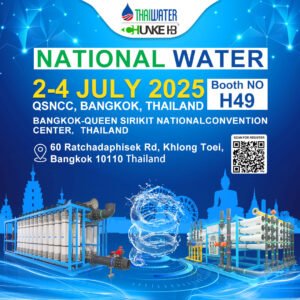THE BEST NEW MOBILE WATER TREATMENT PLANT AND SYSTEM
CHUNKE is professional mobile water treatment plant and system producer with 15 years’ experience in China.
Industrial production managers have to balance operating costs with investment capacity, while continuing to meet production needs and environmental considerations. Where there are not enough places for new capacity due to time or finance issue. CHUNKE provides a flexible, mobile solution accordingly. Hence, our mobile, modular units for process water production and wastewater treatment are a scalable alternative, so your plant can adapt quickly to variations in production levels and operational activity accordingly.

As a result, our mobile water treatment solution provides an ideal temporary solution in various challenging situations.
What is a mobile water system?
Mobile water treatment plant or mobile water systems call as containerized water treatment system. So, they have same functionality with normal water treatment system. Hence, we can install reverse osmosis system, ultrafiltration system, electro-deionization system, wastewater system, water filtration system or water softener system in 10ft, 20ft or 40ft container.
What are the 3 types of water treatment plant?
A reverse osmosis plant is a manufacturing plant where the process of reverse osmosis takes place. Inverse osmosis is a common process to purify or desalinate contaminated water by forcing water through a membrane. Water produced by reverse osmosis may use for a variety of purposes, including desalination, wastewater treatment, concentration of contaminants, and the reclamation of dissolved minerals. For more information, please see our video.
Ultrafiltration (UF) is a variety of membrane filtration in which forces like pressure or concentration gradients lead to a separation through a semipermeable membrane. Hence, suspended solids and solutes of high molecular weight are retained in the so-called retentate, while water and low molecular weight solutes pass through the membrane in the permeate (filtrate). So, we use this separation process in industry and research for purifying and concentrating macromolecular (103–106 Da) solutions, for example, protein solutions.
Meanwhile, ultrafiltration is not fundamentally different from microfiltration. Both of these separate based on size exclusion or particle capture. So, it is fundamentally different from membrane gas separation, which separate based on different amounts of absorption and different rates of diffusion. Meanwhile, industry defines ultrafiltration membranes by the molecular weight cut-off (MWCO) of the membrane used. Ultrafiltration is applied in crossflow or dead-end mode.
Electro-deionization (EDI) is a water treatment technology that utilizes electricity, ion exchange membranes and resin to deionize water and separate dissolved ions (impurities) from water. Hence, it differs from other water purification technologies in that it is done without the use of chemical treatments and is usually a polishing treatment to reverse osmosis (RO). There are also EDI units that are often referring to as continuous electrodeionization (CEDI) since the electric current regenerates the resin mass continuously. CEDI technique can achieve very high purity, with a conductivity below 0.1 μS/cm accordingly.
What are the 5 steps of water treatment plant?
The 5 major unit processes include chemical dosing, filtration, membrane filtration, sterilizing and polishing. There are chemicals added to the water as it enters the various treatment processes accordingly.
- Chemical dosing system: Including disinfection, pH adjustment, anti-scalant dosing, antifouling dosing, coagulation, flocculation, sedimentation, mineral dosing.
- Filtration: Sand Filtration, Carbon Filtration, Multi-media Filtration, Bag Filters, Cartridge Filters accordingly.
- Membrane Filtration, Reverse Osmosis (RO) Membrane filtration, Ultrafiltration (UF) Memrane filtration, Electrodeionization Filtration
- Sterilizing and Disinfection Systems: Ozone generator, UV Light Sterilizer
- Polishing System: Mix bed ion exchange resins, media filtration systems.
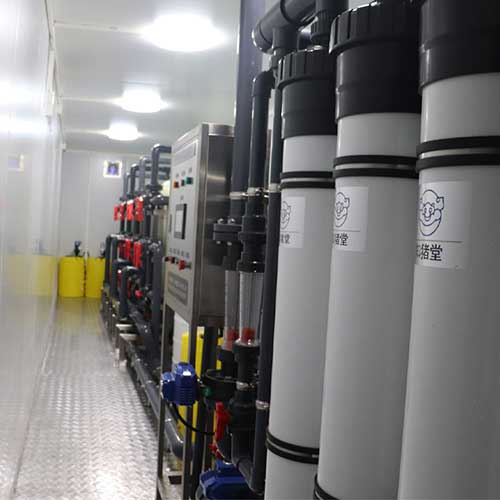
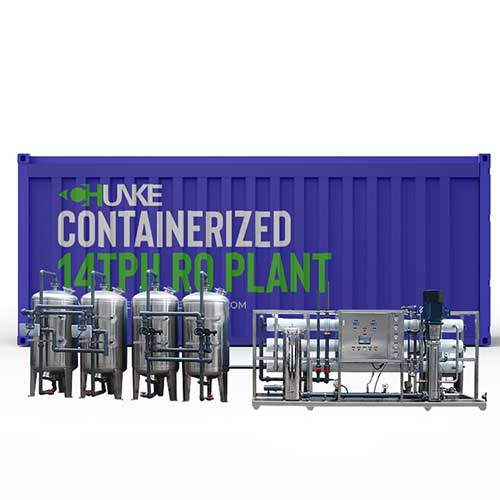
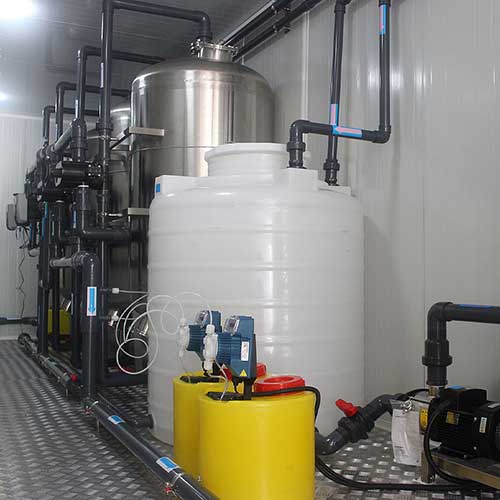
How to control temperature in Containerized Water Treatment System?
We can use heat insulation panel in container, also we can add air-conditioner in container to keep temperature at medium level. So, although you put container under direct sunlight, temeperature can not increase sharply.
Containerized Water Treatment Plant Cost
Mobile water treatment plant is economical solution for your water problem. First of all, it is mobile, after your project is finished, you can use it in another project. So, it allows you to save a lot of money.
The cost of containerized water treatment system is depending on your water source, water analysis report, materials, brands and application.
CHUNKE will supply best price as regards to your budget for mobile water treatment plant.
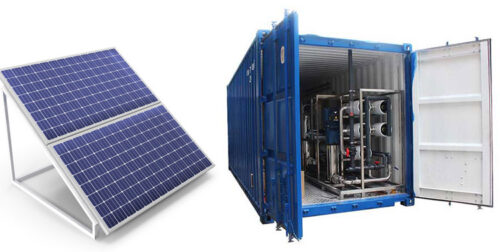
Solar Powered Containerized Water Treatment & Filtration Systems
“Can i add solar panel to containerized water treatment system?” is mostly asked by customers. Yes, CHUNKE has solar powered Mobile Water Treatment Plant Solution. We can install panels on container or available ground, as a result you reduce electricity cost.

